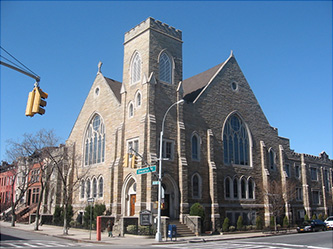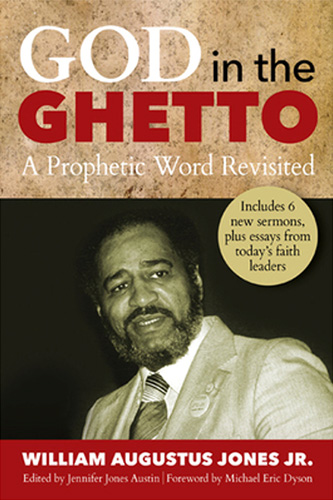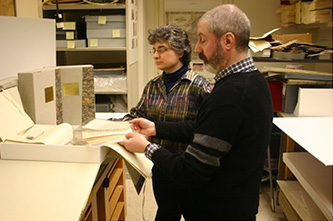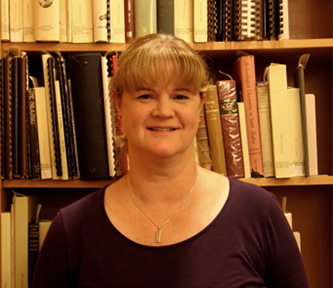Rev. William Augustus Jones Archives Digitized

Bethany Baptist Church. Brooklyn, NY

Front cover of God in the Ghetto, 2nd edition

College Conservator Vyacheslav Polishchuk and Deputy Archivist Marianne Labatto at work in the conservation lab.

Jennifer Jones Austin

Colleen Bradley-Sanders, Head of Archives and Special Collections
Colleen Bradley Sanders, chief archivist of the Brooklyn College Library and Archives has announced that the collection of Rev. William A. Jones Jr., the late pastor of Brooklyn’s Bethany Baptist Church and one of Brooklyn’s most prominent religious and community leaders, has been digitized and is ready to share with students, faculty, and researchers. The collection reveals the legacy, teachings, and philosophy of this larger than life stalwart of Brooklyn’s black community who was an activist for racial justice and Brooklyn’s civil rights movement.
As the pastor of Brooklyn’s 5,000-member Bethany Baptist Church for more than 40 years, Jones was a tireless champion for economic and social justice and co-founded the Progressive National Baptist Convention with Martin Luther King Jr. He succeeded Jesse Jackson as chair of the Southern Christian Leadership Conference’s Operation Breadbasket. Much of Jones’ legacy reflects his leadership in the New York civil rights struggles of the 1960s and 70s. He led boycotts against local businesses that discriminated against African Americans and used his ministry as a platform to encourage his congregation to participate in political elections and broader social movements. He was a nationally known figure as well, who was invited to give talks throughout the country and across the world. Given his prominence and impassioned messages, Jones was approached by New Jersey radio station WFME in 1975 with an offer to broadcast his weekly Sunday sermon as The Bethany Hour. The collection contains records of Jones’ church and community activities, and nearly 800 recordings of The Bethany Hour (1975-2000s), made on audiocassette, quarter-inch audio tape, VHS, and Betamax videotape.
Jones graduated with honors in sociology from the University of Kentucky and went on to earn a doctorate from Crozer Theological Seminary in Chester, Penn. While studying at Crozer, Jones became close associates of King and Samuel D. Proctor , who all went on to become well-known preachers in the Black church. He joined King in 1961 to split from conservative Baptists and the Progressive National Baptist Convention. He was known for his outspokenness and being involved in controversial causes in the New York City area. In the 1960s, he was introduced to the Pentecostal preacher, Rev. Al Sharpton, and became one of his mentors. He published a book, God in the Ghetto (Progressive Baptist Publishing House, 1979). At all times, Jones combined his passion for the Christian message of God’s love and forgiveness with his passion for fighting for the political and human rights of all of God’s creations.
Thanks to a connection made by then Brooklyn College student Kojo Davis, who was an active member of the church working on a documentary of the late pastor, the family agreed to turn over Jones’ materials to the Brooklyn College Library after his death in 2006. Deputy Archivist Marianne Labatto recalled going with former archivist Professor Anthony Cucchiara, and Conservator Vyacheslav Polischuk to Jones’ home on Maple Street and to the church, to pick up the collection using a truck borrowed from the Facilities office. She explained that most of the archival items were already packed in boxes, so the staff did not get a true sense of the collection until it was processed and they began to select items for an exhibit in 2008. “Once we began to unpack and organize the collection, I fully understood the importance of Reverend Jones' papers. The documents, photographs, speeches, and sermons contained within these transport boxes revealed Reverend Jones' work in the civil rights movement and as an educator and spiritual leader in Brooklyn and on the national level,” said Labatto.
Jones’ legacy of civil rights activism grounded in Christian faith is carried on through the work of his daughter, Jennifer Jones Austin, who chairs the NYC Racial Justice Commission and is CEO of the Federation of Protestant Welfare Agencies (FPWA), an anti-poverty, policy, and advocacy organization with 170 member agencies and faith partners. She still works closely with Sharpton and is the vice chair of the board of his organization, National Action Network. Austin also frequently guest hosts Sharpton’s weekly nationally syndicated radio show and appears frequently on the cable show, “Brooklyn Savvy.” She is the editor of the second edition of God in the Ghetto: A Prophetic Word Revisited (Judson Press, 2021), the re-release of Jones’ seminal work deconstructing the system of racism, capitalism ,and militarism and how they work in concert to oppress people of color.
Bradley-Sanders understood that accepting a collection requires accepting the responsibility not only to provide access, but to preserve it. Thus, her office spent many years planning how best to preserve the tapes and other materials. Knowing that outside funding was needed, she pursued a grant through the Council on Library and Information Resources’ Recordings-at-Risk program, which focuses on digitizing rare and unique recordings of high scholarly value. The grant proposal and letters of support articulated Jones’ influence and helped define for the funding agency the importance of the collection and why digitization was required to provide complete access. In the grant application, Bradley-Sanders emphasized that future researchers would need to actually listen to the recordings to understand the impact that Jones made on his congregants and radio listeners. Though transcripts are also needed, the library stressed the need to preserve the actual recordings of his powerful voice and unmistakable cadences.
The grant was awarded in Oct. 2019, and despite challenges posed by the shift to remote work due to COVID-19, the project was finally completed in 2021. The digitized sermons are now available to the public on Brooklyn College’s illumira platform. In addition to the Special Collections tab on the College’s illumira page, the digitized sermons can be discovered in the Brooklyn College catalog, on the Archives’ web page, and are featured in the American Theological Library Association Digital Library.
Currently, the Archives is working to create sermon transcripts to aid researchers. Work on the first group of transcripts was funded by a generous donation from Jones Austin. To create them, the Archives utilizes a feature on YouTube that generates a transcript of files uploaded to the platform. An intern edits the YouTube transcript and uploads them to illumira, where they are linked with the related audio or video sermon file. This work is ongoing.
Questions about the collection may be sent to: specialcollections@brooklyn.cuny.edu.
Back to Critical Thinking—April 2022





